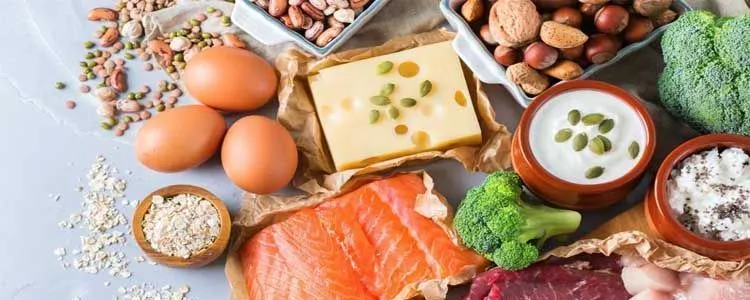Although vegetarian food is gradually being imposed, there are real impediments for vegans in obtaining certain nutrients, which can be easily bottled and in sufficient quantity in animal products.
In this article we wanted to gather some of those essential nutrients and what are the main sources of food to obtain them. In any case, there are supplements in the form of capsules and tablets to obtain them in the vegan diet.
And as usual, there is also the opposite case, where there are nutrients that food from animals can not obtain, and yes they are obtained through the feeding of vegetables and vegetables.
Table of Contents
Vitamin B12
This is one of the most well-known cases. Vitamin B12 is considered an essential nutrient that we hardly find in vegetables in sufficient quantities
This vitamin is also known as cobalamin, a soluble substance that is involved in the formation of red blood cells, the maintenance of the nervous system, and the functioning of brain activity.
The single consumption of vegetables can lead to a deficiency of this vitamin, so it is necessary to resort to alternatives in the form of supplements. [See study]
However, in animals such as fish, meat, dairy products or eggs we find it relatively easily and in high quantities and concentrations.
A vegetarian person will have no problem getting vitamin B12 through dairy or eggs. On the other hand, a vegan person will need supplements. [See study]

Symptoms derived from the absence of vitamin B12
- Fatigue and general weakness
- Neurological disorders in newborns
- Megaloblastic anemia
- Psychiatric and neurological disorders
- Impaired brain function
- Relationship with Alzheimer’s
- Relationship with heart disease
Is there really no food in the plant world that has B12? Yes, of course there is.
The presence of vitamin B12 has been documented in products derived from soybeans, cereals, algae and tempeh (fermented soybeans). However, its content is very low and would require eating large doses of these foods to meet our needs.
Spirulina, a type of microalgae, also contains vitamin B12. The problem is that it is not in bisponible doses by our body. Therefore, the scientific community establishes that it is not a viable source of this nutrient.
Iron (heme type)
Iron is a micronutrient that we can get from many foods. Legend tells us that with spinach we get a great source, although today it is known that this is not the case and is the result of a miscalculation.
Despite this, in plant foods we get sources of non-heme iron that have difficult absorption by our body and are transformed in an optimal way.
Therefore, in addition to knowing the amount of iron that each food has, we must know if the assimilation of the mineral is good, medium or bad.
To do this, we can consult this table with the characterization of iron-rich foods and their absorption rate.
The better absorption rates of this micronutrient are obtained with the food from meat.
Not only is it very well absorbed, but it also causes iron from the plant kingdom to increase its assimilation and bioavailability. [See study]
For this reason, in many cases, people who eat a vegetarian and vegan diet are more likely to suffer from anemia compared to those who eat a diet rich in meats.
In this case, the solution to anemia requires taking food supplements of vegetarian origin but with a higher rate of iron bioavailability.
Creatine
The creatine is a nitrogenous organic acid present in muscle fibers and nerves of animals. Therefore, it has no substitute in the plant world.
Creatine acts in our body as a source of energy reserve, specifically for muscle cells, improving endurance and the contribution of strength.
Within the world of bodybuilding, it is one of the best known supplements to stimulate muscle development. Showever, it is also essential for anyone, regardless of their physical condition,
Although this compound occurs naturally in the liver, it has been found that vegetarians have a noticeably lower concentration of this compound at the muscular level. [Source of information]
This decrease is valuable from the 1st month in which the intake of meat, dairy and eggs is reduced, specifically muscle creatine.
There is no food from vegetables that is a creatine source, so that only food supplements can be used.
In any case, an adequate level of creatine allows to obtain improvements in the physical performance (at the muscular level) and brain activity and function.
Supplements rich in creatine
Carnosine
Although it is not a well-known compound by the population, it is considered a powerful antioxidant located in the muscles of our body and in the brain.
Therefore, and like creatine, it is very important for the development of muscle function, the reduction of fatigue and better performance of the musculoskeletal system. [Ver más información]

The problem is that carnosine can only be found in food of animal origin. For vegans, keep in mind that it is not an essential nutrient and the body can obtain it naturally from the amino acids beta-alanine and histidine.
On the other hand, beta-alanine is only obtained from fish and meat sources, so it has been shown that, at the muscular level, there is a lower concentration of carnosine in the muscles of people with a vegetarian diet. [See study]
Supplements based on carnosine or beta-alanine produce a positive impact at the level of improved endurance, reduction of fatigue and increase in muscle mass.
Carnosine-based supplements
Docosahexaenoic acid (DHA)
Within the world of Omega 3 fatty acids, whose source can be found in many vegetables (like avocado, for example), there is a specific type known as docosahexaenoic acid (DHA).
With a name with difficult pronunciation, it is known to perform important functions in the development of the organism and brain activity. [See study]
It is considered an essential nutrient, and its absence or deficit can cause disorders in mental health and the proper functioning of brain functions, especially in developing children.
Docosahexaenoic acid (DHA) is important in pregnant women, as it is the period where the brain is developing in the unborn child. [See study]
Therefore, it is necessary to supply it in sufficient quantities, and this is done by fish consumption fatty or fish oils.
For vegetarians or vegans, moderate sources of DHA can also be found in microalgae and all kinds of seeds (flax seeds, chia and walnuts, among others).
Our body can also produce docosahexaenocio acid (DHA) from omega 3 fatty acid, although its conversion does not occur in the most optimal way possible and in most cases we must resort to introducing it into our body through food.
A selective vegan or vegetarian diet can lead to reduced levels of this essential nutrient, so you have to supplement it until you find a direct source of DHA.
Cholecalciferol (vitamin D3)
Within the group of vitamins, D3 is essential for the body and covers very important functions.
Its deficiency is related to problems of all kinds, which we list as follows:
- Lower bone strength (osteoporosis)
- Increased risk of cancer.
- Depression.
- Multiple sclerosis.
- Muscle loss and reduced strength.
- Impaired brain function.
- Heart disease.
One of the most visual examples of the vitamin D deficiency it is rickets and osteoporosis.
As you can see in our article about the foods with vitamin D, can be obtained in dairy products, fish, but also in some mushrooms (such as shitake).
Sun exposure is one of the best and most effective sources of vitamin D, but it’s notmpre all countries can enjoy long periods of exposure to the sun.
Within vitamin D, we find 2 subgroups, known as ergocalciferol (D2) and cholecalciferol (D3), present in foods of animal origin.
Within these two groups, it is cholecalciferol (D3) that causes the greatest physiological effects in our organism, being the most bioactive source. [See information]
Foods rich in vitamin D
| Foods | Quantity (g) | Vitamin D (IU) |
|---|---|---|
| Cod liver oil | 1 tablespoon | 2300 |
| Salmon | 100 g | 624 |
| Sardines (can/fresh) | 100 g | 480 |
| Margarine | 100 g | 429 |
| Oysters | 6 oysters (medium) | 269 |
| Mushrooms, shitake | 4 fungi (medium) | 249 |
| Canned tuna, mackerel | 100 g | 230 |
| Shrimp, prawns | 100 g | 152 |
| Herring | 100 g | 120 |
| Evaporated milk | 1 cup | 97 |
| Whole milk, skim | 1 cup | 92 |
| Butter | 100 g | 56 |
| Milk cream | 100 g | 52 |
| Swiss cheese | 100 g | 44 |
| Parmesan cheese | 100 g | 28 |
| Egg yolk | 1 yolk | 25 |
| Camembert cheese | 100 g | 12 |
| Cheddar cheese | 100 g | 12 |
If in your diet you do not accept the consumption of these foods and you live in an area with low sun exposure, it is necessary to consider taking supplements based on bioactive vitamin D.
Taurine
The taurine is an organic compound rich in sulfur that is evenly distributed by muscle tissue and organs such as the kidneys, heart and brain.
Although today there are not many studies that allow us to know in depth what are the functions of taurine in the body, it seems that it plays an important muscular function, as well as the activation and reinforcement of the antioxidant defenses of our body. [See information]
It is not considered an essential nutrient, but semi-essential, because not all organisms are able to synthesize it.
There is a growing myth where it is claimed that taurine comes from the testicles or bile of the bull and many energy drinks are based on the extraction of animal compounds. Much further from reality. This myth stems from the fact that taurine was first identified in bull bile, but is present in many other animals, including humans.
It is scientifically known that an adequate presence of taurine in the body promotes adequate cardiovascular health, reduce cholesterol and reduce blood pressure.
Unfortunately, it is only found in foods such as fish, meats of all kinds, seafood, and dairy products.
Although it is not an essential nutrient, in case it is needed, vegetarians can obtain it from nutritional supplements, synthesized in the laboratory (just like those they do for energy drinks).
